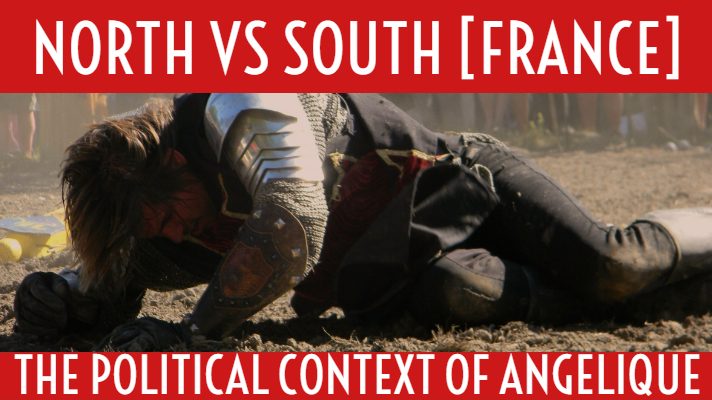While I was reading Angelique, I was mainly intrigued by the interplay and conflict between scientific thought, as represented by her husband Joffrey, and the conservative ideas of the Catholic Church, which acts as his main antagonist. But gradually it dawned on me that the plot of Golon’s book is a replay of a larger political conflict in French history. As I read up on fin amor, troubadours, Occitan and Languedoc, I began to notice repeated references to the suppression of the language, people and culture of Southern France by the political power center of Northern France.
The Albigensian Crusade
The Occitan region, Bryson and Movsesian mention, was subjected to a violent campaign of oppression from Northern France in the 13th century:
Paris’ dismissive attitude reflects a long history of northern contempt for, and violence against the south (le Midi), its culture, languages, and poetry. This history stretches back to the tensions leading up to the Albigensian Crusade of the thirteenth century, in which the domination of the northern Franks was established with sword, fire, and blood.
The Albigensian Crusade was apparently against the Cathars, and while B&M note that the ideas in troubadour poetry do not reflect the doctrine of the Cathars, it is nevertheless a moment of French interregional violence that sits in Occitan history and affects the troubadours. A Harvard introduction to troubadour poetry says that after the Crusade,
Social and political dynamic changed, and even if Occitan poets continued to compose, one cannot help to think, while reading the poetry of the late thirteenth to the fifteenth century, that it was not the same. The dompnas of yesteryear tended to be replaced by Dompna Maria, perhaps as a gage of full religious orthodoxy.
B&M also note that the Albigensian Crusade, taking place between 1209 and 1229 CE, both crushed the troubadour culture and the courts that supported and immediately preceded the establishment of the Inquisition in 1232. Perhaps nobody expects the Spanish Inquisition in France, but it was there and it is the last official representative of the Inquisition in France who brings charges of witchcraft against Joffrey for his chemical (but not alchemical) experiments and work in Angelique.
One hundred years later, the Padens write in the introduction to their anthology “Troubadour Poems From the South of France” (2007), the Occitan literary tradition was already seen as something that needed to be saved.
In the early fourteenth century a literary society, the Sobregaya companhia del Gay Saber, or the “Exceedingly Merry Company of the Merry Wisdom,” was founded at Toulouse to preserve the best of the troubadour tradition.
Cultural suppression through the 20th century
The thirteenth and fourteenth centuries, of course, are distant past from the 1950s when the Golons were writing their novels. However, the Albigensian Crusade was not the only incident I ran across. A BBC article on the survival and revival of Occitan culture and language notes
in 1539, King François I signed into law an edict, the Ordonnance de Villers-Cotterêts, which made Francien, the northern French dialect of Paris and the Île-de-France, the entire county’s official language.
and
at the turn of the 20th Century, the central government launched an aggressive campaign to extinguish any language that was not the standardised French. Occitan was forbidden to be taught in schools, and any children who used their mother tongue were punished, a practice that infused deep shame in many people. Many older adults in the Dordogne still tell stories about being humiliated in school for speaking Occitan.
Here’s a quote from a Cambridge professor at King’s College, Bill Burgwinkle , who says
“The French state, especially after the Revolution, wanted to see France as a unified country and made it illegal to speak Occitan. It wasn’t until 1981 they were allowed to have radio stations that could play music in Occitan.”
(In addition to Occitan culture and and the movement of manuscripts across Europe in the Middle Ages, Prof Bill Burgwinkle apparently studies the parallels between saints’ images and pornography, which sounds like a fascinating rabbit hole I cannot go down today.)
At this juncture, I’d like to note that Anne Golon was born in 1921, in Toulon, a port in south-eastern France. Toulon is in Provence, which is part of the historical region of Occitan. Provençal (provençau or prouvençau) is one of the six dialects of Occitan; the others are Gascon, Languedocien (lengadocian), Limousin (lemosin), Auvergnat (auvernhat), Shuadit language, and the Vivaro-Alpine.
Are you surprised that Golon was Occitanian? I am not.
With this context, I can see that throughout Angelique Golon is working with the theme of historical oppression of the Southern region by Northern France. She makes her characters those of Southern France, in Poitiers and Toulouse, and makes many references to their speech in the Southern dialect. Joffrey is not only seeking to re-establish the ideas of fin amor, he is a troubadour himself. Angelique, at the time of her marriage, has heard of the “Golden Voice of Languedoc” but does not realize until later that the renowned singer is one and the same as her husband.
In an echo of the Albigensian Crusade and the Inquisition, Joffrey is brought low by the Catholic Church. His lands and property are seized by the King in Paris and the southern Court of Love is again crushed and lost. All of which is an interesting context and historical depth to the novel which I wouldn’t have realized if I hadn’t gotten a bee in my bonnet about courtly love and the troubadours!
References & Further Reading
- Bahrami, Beebe. “The language the French forbade“. 11 Sept 2018. BBC Travel.
- Bryson, Michael and Arpi Movsesian. Love and its Critics: From the Song of Songs to Shakespeare and Milton’s Eden. 2017. OpenSource Publishers.
- “Troubadours.” Poetry at Harvard.
- “Troubadours, medieval erotica and the myth of a national language.” September 2014. Current Research. King’s College.



